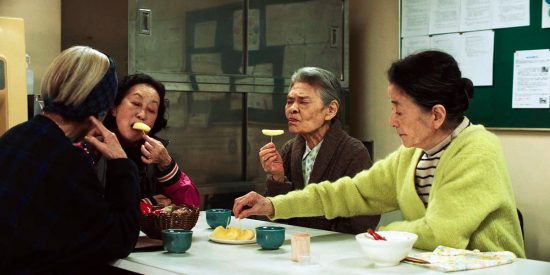TIFF 2022 Review: Plan 75 – “A quiet, contemplative and largely unsentimental film”

Courtesy of TIFF
The population of the world is getting older. Where I live, in 2012 one in seven Canadians was a senior. By 2030 it will be almost one in four. This shift in demographic is happening even faster in Japan, which has already surpassed these numbers in what they call a “super-aged society”. And with more seniors and fewer working members of society, this has ramifications on a country’s economy, and its healthcare.
Writer-director Chie Hayakawa’s first feature, Plan 75, which debuted at Cannes, imagines a world where Japan has figured out a way to deal with their ‘senior problem’. The government introduces a controversial program, Plan 75, where those 75 and older can, in the spirit of self-sacrifice, end their own lives. The service is free, in fact those that enrol are offered $1000 to spend however they like – though some use it on funeral costs.
Hayakawa constructs a quiet, contemplative and largely unsentimental film. It starts out with a surprising and impactful first act introducing us not only to the idea of elder euthanasia but also to Michi and her friends, who love karaoke and sharing a humble lunch together. Baisho is superb as Michi, and we immediately care for her and her well-being. It is impossible not to have empathy for this woman, who is essentially on her own as the world she lives in turns its back on her. It would have been easy just to have tunnel vision for her character, yet Hayakawa also wants to show us another side to the impacts of Plan 75.
In an added layer of complexity, we are introduced to youth also affected by this state-sponsored plan: Hiromu (Hayato Isomura), the young man that signs her up for the program before realizing how horrible it really is, the caseworker (Yumi Kawai) who forms a bond with Michi after speaking to her on the phone for 15 minutes each call, Maria (Stefanie Arianne) an employee given the task of removing the meager belongings from every corpse while she is trying to save money for her daughter’s life-saving surgery. All of them have an emotional stake as their own individual journeys within Plan 75 progress. They serve to highlight the additional horrors within Plan 75, which becomes a terribly profitable endeavour for the private companies leeching off its participants. It’s a slippery slope, especially once money is involved. Why not make the minimum enrolment age 65 instead?
Plan 75 faces us to confront our own mortality and thoughts on aging and death, but more than that it asks us when we start to devalue those around us. At what age do we become ‘less than’? When do we start to treat our elders with apathy? Is productivity the only thing that matters? Hayakawa is not afraid to ask the hard questions and she sugar coats nothing, neither stylistically nor within the realm of the story itself. It feels only too realistic which is saying something, though there are moments of the film that do drag slightly in their quiet introspection.
In the end, in its own somber way, Plan 75, while distinctly calling out ageism, is also a celebration of life. We may not know what the future holds for us, or for Michi, but that there is a future at all is a blessing. While an aging population is a very true reality, Plan 75 is a call to be prepared in a way that preserves human dignity, for as we look in the mirror each day, time is chasing each and every one of us.










